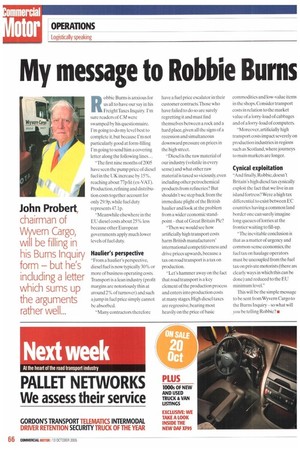My message to Robbie Burns
Page 68

If you've noticed an error in this article please click here to report it so we can fix it.
Robbie Burns is anxious for us all to have our say in his Freight Taxes Inquiry. I'm sure readers of CM were swamped by his questionnaire. I'm going to do my level best to complete it, but because I'm not particularly good at form-filling I'm going to send him a covering letter along the following lines...
"The first nine months of 2005 have seen the pump price of diesel fuel in the UK increase by 15%, reaching about 77p/lit (ex-VAT). Production, refining and distribution costs together account for only 29.9p. while fuel duty represents 47.1p.
"Meanwhile elsewhere in the EU diesel costs about 25% less because other European governments apply much lower levels of fuel duty.
Haulier's perspective
"From a haulier's perspective, diesel fuel is now typically 30% or more of business operating costs. Transport is a lean industry (profit margins are notoriously thin at around 2% of turnover) and such a jump in fuel price simply cannot be absorbed.
"Many contractors therefore have a fuel price escalator in their customer contracts.Those who have failed to do so are surely regretting it and must find themselves between a rock and a hard place, given all the signs of a recession and simultaneous downward pressure on prices in the high street.
"Diesel is the raw material of our industry (volatile in every sense) and what other raw material is taxed so viciously, even including other petrochemical products from refineries? But shouldn't we step back from the immediate plight of the British haulier and look at the problem from a wider economic standpoint that of Great Britain Plc?
-Then we would see how artificially high transport costs harm British manufacturers' international competitiveness and drive prices upwards, because a tax on road transport is a tax on production.
"Let's hammer away on the fact that road transport is a key element of the production process and enters into production costs at many stages. High diesel taxes are regressive.bearing most heavily on the price of basic commodities and low-value items in the shops. Consider transport costs in relation to the market value of a lorry-load of cabbages and of a lorry-load of computers.
"Moreover, artificially high transport costs impact severely on production industries in regions such as Scotland, where journeys to main markets are longer.
Cynical exploitation
And finally, Robbie, doesn't Britain's high diesel tax cynically exploit the fact that we live in an island fortress? Were a high tax differential to exist between EC countries having a common land border one can surely imagine long queues of lorries at the frontier waiting to fill-up.
-The inevitable conclusion is that as a matter of urgency and common-sense economics, the fuel tax on haulage operators must be uncoupled from the fuel tax on private motorists (there arE clearly ways in which this can be done) and reduced to the EU minimum level."
This will be the simple message to be sent from Wyvern Cargo to the Burns Inquiry so what will you be telling Robbie? al












































































































































































































